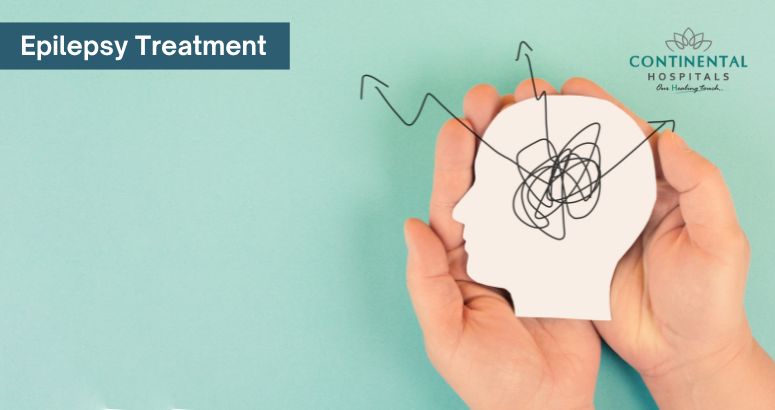- Email: [email protected]
- International Concierge : +91 995 166 0000
- General Enquiry : +91 40 6700 0000
Epilepsy Treatment

Epilepsy is a neurological disorder characterized by recurrent seizures. Seizures are brief episodes of abnormal electrical activity in the brain that can cause various symptoms, including uncontrolled muscle movements, altered consciousness, and sensory disturbances. Epilepsy affects millions of people worldwide, and while there is no cure, there are effective treatments available to manage seizures and improve quality of life.
Causes of Epilepsy
The exact cause of epilepsy is unknown in many cases. However, several factors can contribute to its development:
Genetics: Epilepsy can run in families, suggesting a genetic predisposition.
Head injury: A serious head injury can damage brain tissue and increase the risk of epilepsy.
Stroke: Strokes can also damage brain tissue and lead to epilepsy.
Brain infections: Infections such as meningitis or encephalitis can cause inflammation in the brain and trigger seizures.
Brain tumors: Brain tumors can irritate brain tissue and cause seizures.
Developmental brain disorders: Certain developmental brain disorders, such as autism spectrum disorder, are associated with an increased risk of epilepsy.
Symptoms of Epilepsy
The symptoms of epilepsy vary depending on the type of seizure a person experiences. There are two main categories of seizures:
Focal seizures: These seizures originate in a specific part of the brain. Symptoms can include muscle twitching, sensory disturbances, or changes in mood or behavior.
Generalized seizures: These seizures involve the entire brain. They can cause a variety of symptoms, including loss of consciousness, convulsions, and loss of bladder or bowel control.
Diagnosis of Epilepsy
Diagnosing epilepsy typically involves a combination of tests, including:
Medical history and physical examination: A doctor will discuss your medical history and ask about your symptoms. They may also perform a physical examination to look for signs of neurological problems.
Electroencephalogram (EEG): An EEG measures electrical activity in the brain. It can help to detect abnormal electrical patterns that are associated with epilepsy.
Neuroimaging tests: Imaging tests such as MRI or CT scans can help to identify any structural abnormalities in the brain that may be contributing to seizures.
Treatment Options for Epilepsy
Treatment options for epilepsy vary depending on the type and severity of the seizures, as well as individual factors such as age, overall health, and lifestyle. Here are some common treatment approaches:
Vagus Nerve Stimulation (VNS): This is a surgical treatment option where a device is implanted under the chest's skin with a wire connecting to the vagus nerve in the neck. The device sends regular electrical impulses to the brain to help prevent seizures.
Responsive Neurostimulation (RNS): This is another surgical option where a device is implanted in the skull that monitors brain activity. When abnormal electrical activity is detected, the device delivers electrical stimulation to stop the seizure from happening.
Epilepsy Surgery: In some cases, surgery may be an option to remove the part of the brain that is causing the seizures. This is typically considered for people who have seizures that originate from a specific area of the brain that can be safely removed without causing significant functional impairment.
Lifestyle Changes: Avoiding triggers such as lack of sleep, stress, or certain foods and managing stress through relaxation techniques or therapy can help reduce the frequency of seizures in some individuals.
Alternative Therapies: Some people find relief from seizures through complementary therapies such as acupuncture, yoga, or herbal supplements. However, it's important to discuss these options with a healthcare provider, as they may not be suitable for everyone and could interact with medications.
Living with Epilepsy
Epilepsy can be a challenging condition to live with, but there are many things you can do to manage your seizures and improve your quality of life. Here are some tips:
Take your medication as prescribed: This is the most important thing you can do to control your seizures.
Get enough sleep: Lack of sleep can trigger seizures, so it is important to get a regular night's sleep.
Manage stress: Stress can also trigger seizures, so it is important to find healthy ways to manage stress in your life.
Avoid triggers: Certain things can trigger seizures, such as flashing lights or alcohol. It is important to identify your triggers and avoid them as much as possible.
Epilepsy treatment is multifaceted, encompassing medication management, surgical interventions, lifestyle modifications, and alternative therapies. By working closely with healthcare professionals, adopting healthy habits, and accessing support resources, individuals with epilepsy can effectively manage their condition and lead fulfilling lives. While epilepsy presents challenges, it does not define one's identity or limit their potential for success and happiness. With proper treatment and support, individuals with epilepsy can thrive and contribute meaningfully to their communities.
.webp)
